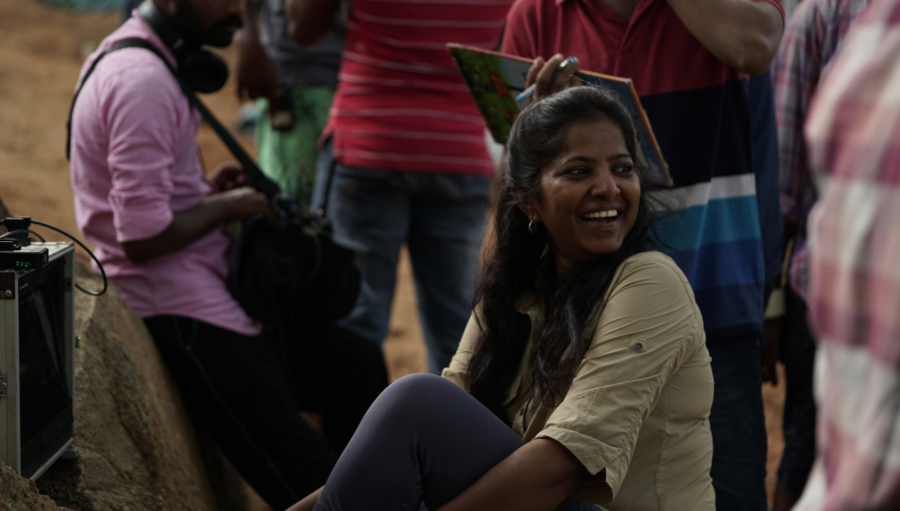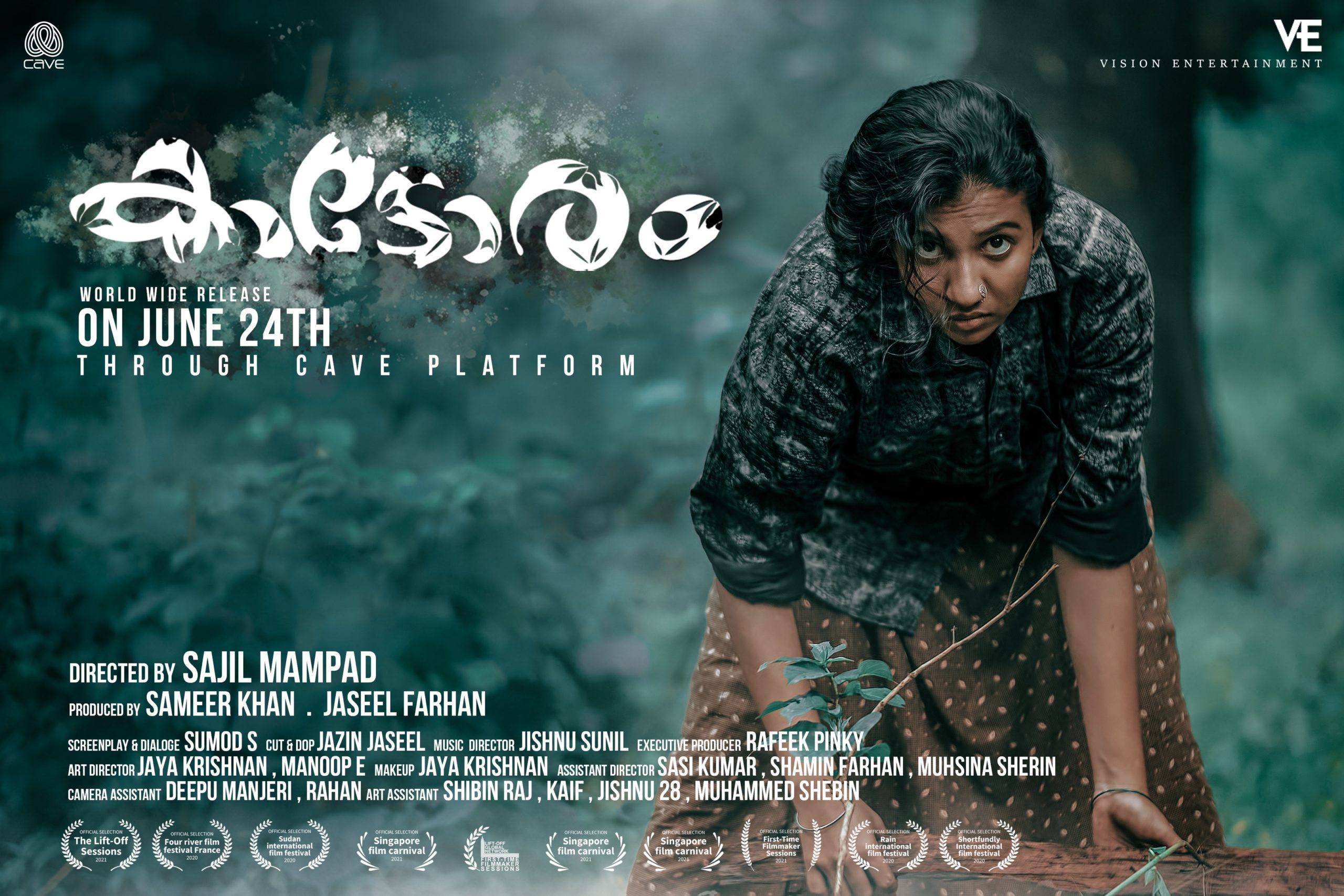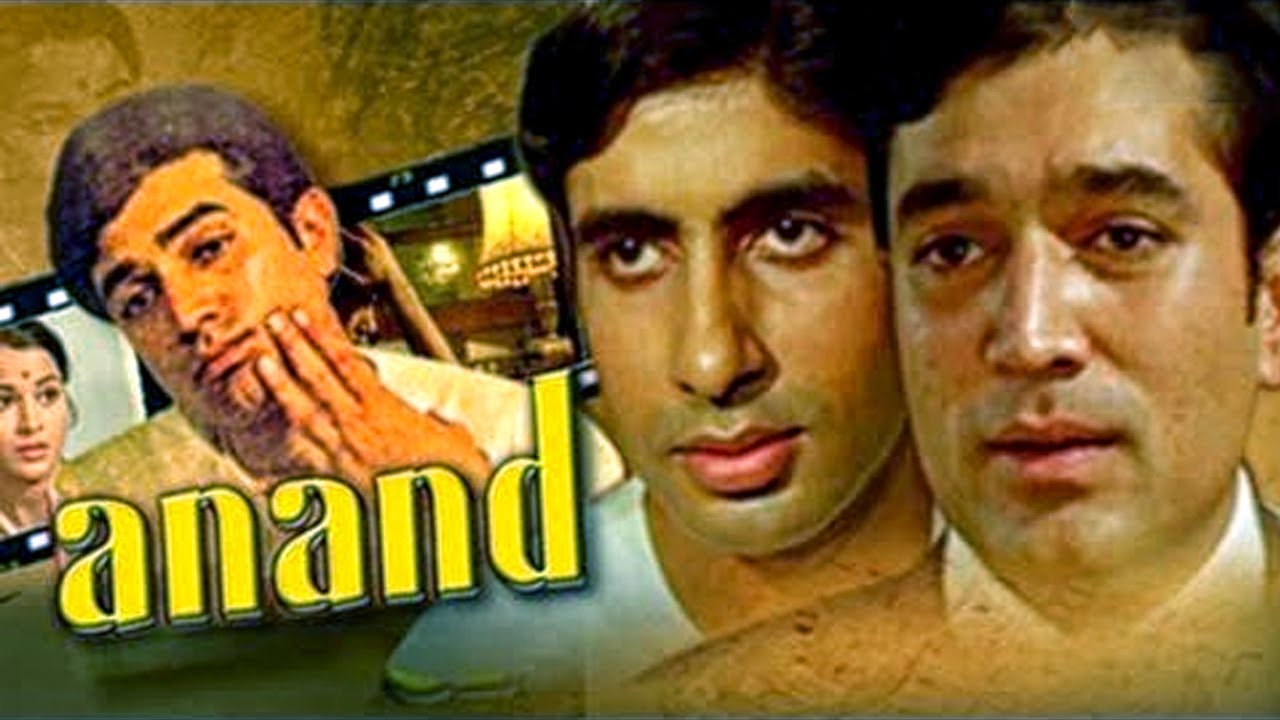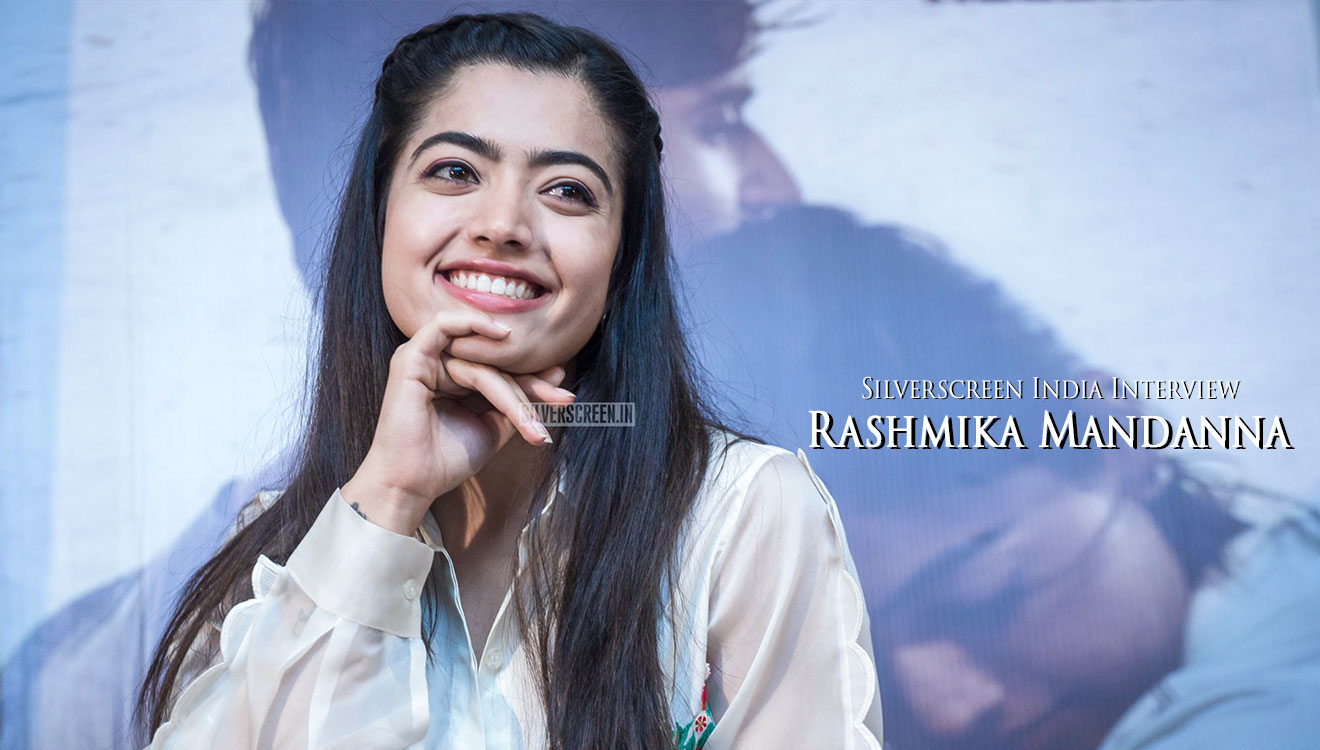Filmmaker and writer Leena Manimekalai is at TIFF (Toronto International Film Festival). “What is so special about TIFF is documentary cinema. It feels good to be in a place where documentaries are respected as much as fiction,” she posted on Facebook recently. In the midst of all the excitement at the festival, Leena also made time to talk to Silverscreen about her new film Maadathy (which she conceived, researched, wrote, produced, directed and is now distributing), on raising funds on Facebook, fighting the good fight with the censor board, #MeToo and its effect on her well-being, and more…
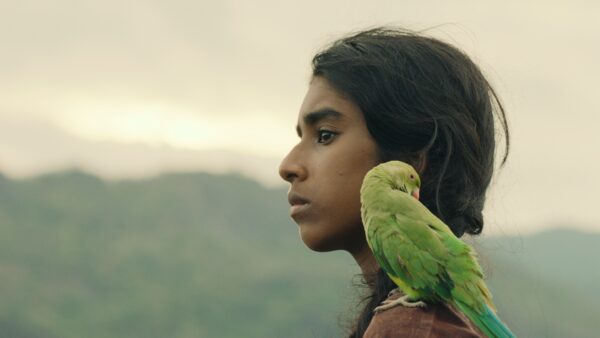
Maadathy 1
Maadathy, an unfairy tale, Leena’s new film’s tagline is ‘Nobodies do not have Gods; they are Gods’. The film is about a girl who grew up in the Puthirai Vanaar caste and how she came to be immortalised as their local deity, Maadathy.
Puthirai Vanaar is a dalit caste group (in south Tamil Nadu) whose forced caste occupation is washing the clothes of other dalits, the dead and, menstruating women. “The sight of the members of the community, according to caste norms, could ‘pollute’ the so-called upper castes. Puthirai Vannars were forced to live in shrubs so they could remain unseeble to others,” Leena’s note for the press about the film explains. She grew up listening to stories of her village deities who were once ordinary women but had extraordinary lives. That’s where the idea for this movie came from too.
How does it feel to have finished Maadathy? Leena says, “It’s been a roller coaster ride. It is a deeply lonely and uncertain path.” The only thing she knows for sure is that she was “much in love with the process and very prepared to face come what may.”
The producer who was supposed to back the project disappeared halfway and Leena had to rise to the occasion. “I could not call off the shoot as the script depended on the season weather-wise, and the sets were pre-invested in and the lead actor was pregnant. I had to raise money by stealing or borrowing. Luckily I had family and friends I could borrow money from and hence my stealing plans had to be dropped,” she jokes.
“For shooting, we were heavily dependent on nature as the western ghat was the protagonist of the film. Involving the community as actors, crew and production team whose priority is not cinema was quite an adventure. So, I did not know what was waiting for me when I woke up, and I went to sleep without knowing if the next day would be a field day. Those were the days,” she reminisces.
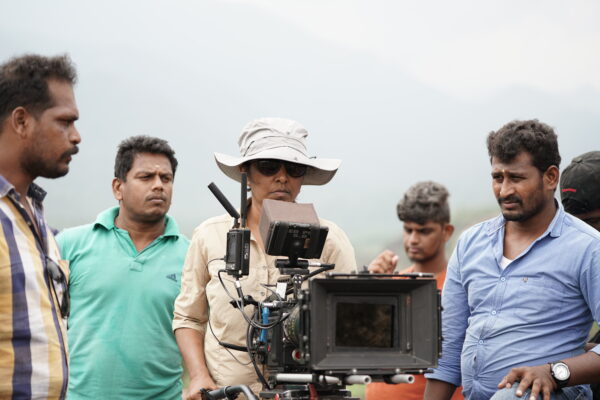
DSC03090
On making a film that involves a community, Leena says, “Working with the community involves a whole lot of dynamics and one has to be ready for any kind of surprise. Elephants enter rice fields, people sight a bear, rains do not stop or there is some caste clash… After an adventurous shoot, I came back to an empty home because I had a breakup in due course, a bank account with a negative balance and lots of dues to pay post-shoot.”
Leena used Facebook to raise money, where she held a fundraiser selling her earlier books and films. “I still remember, I cried when the first contribution hit my account within ten minutes of my post. I was so moved by people’s gestures when they bought my Tamil poetry collections even when they couldn’t read Tamil. Two phases of fundraising enabled me to pay the entire dues and post-production costs. After I arrived at the First Cut, I pitched for the finishing funds at Singapore South Asian Film Festival and won the gap fund. Bhavana, a data scientist working somewhere in Minnesota responded to my Facebook post and came on board as Co-Producer. Maadathy pooled in all the goodness around me and the lesson is if you want to do something with all your heart and soul, the whole world conspires with you to realise it. Yes, Maadathy is here for real, as an epitome of the humanity that I witnessed. Hope is not yet a cliche,” she says.
On the film making it to Busan, she adds, “A world premiere in Busan is a good beginning. I want Maadathy to win hearts across continents as more festival selections are coming through. Theatrical distribution is also on the cards and I want to see the film with my Papanasam and Vikramasinghapuram people in a local Tirunelveli theatre soon.”
Leena spent several years ideating Maadathy, close to one year in reading and research and two years actually making the feature-length fiction film. In her first draft, this was a sociopolitical drama. “When I brainstormed it with my friend and poet Yavanika, we decided to adopt a fairytale format. We wanted to juxtapose the harmonious nature with the hierarchical human and see the alchemy, rather than sticking to gender and caste as civil issues. Screenwriter Rafiq Ismail completed the writing process by waking up the land and language to the core and conscience of western ghats. Moorthy, a first-generation graduate of the Puthirai Vannar community and a retired Thashildar now, who mentored us through the whole project like our Moopan (elder) gave his expert guidance and inputs in every step of our creative process,” she adds.
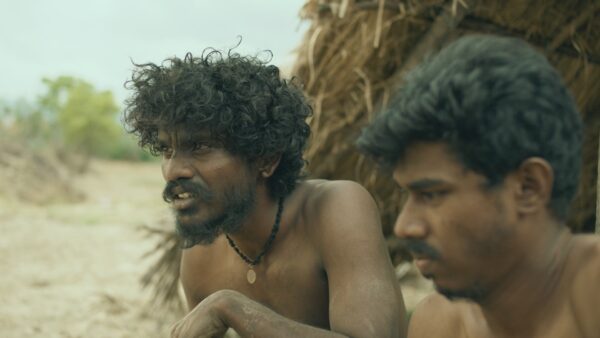
Maadathy 4
Leena worked with a small crew used guerilla techniques, unintimidating filming processes and democratic participatory involvement of everyone involved in the making of the film.
“I follow that however hard it is. I don’t believe in director is dictator bull shit. Cinema is teamwork. And we all collectively come together to let a story be told through us. Period.”
Was it ethically important for her to work with the community as well? “In the year 2011, I did Sengadal, the deadsea, where refugees played refugees and fisherfolk played the fisherfolk and the crew played the crew. I want to tell the stories of my people, by the people and for the people. However imperfect. Unfortunately, my films being political and with all the constitutional and extraconstitutional censorships, they hardly get distributed and seen widely by many. But that is not my problem alone,” she explains.
In Maadathy too the censor board’s interference was heavy with too many cuts that struck at the soul of her film. They refused a certification unless cuts were made. Leena went to the Film Certificate Appellate Tribunal on appeal and had the cuts reversed.
“CBFC is an archaic institution and it has to go. It is as simple as that. It is such a sore in the skin of democracy. I do not know when filmmakers will realise the very existence of CBFC is an insult to our sensibilities and collectively come together to bring it down. The 1952 Cinematograph Act has to be challenged if we think we are not stupid. It is not funny that every fucking time I have to run to tribunals and supreme courts to protect my constitutional right to freedom of expression. It is neither cheap nor productive to go through this trajectory for every film. As someone who fights this every time I manage to make a film, I feel like I am some colonial subject and it is so disgraceful and humiliating an experience as an artist and as a free citizen of a democracy. I did manage to quash the ban for my debut feature film Sengadal legally at the Tribunal and again cleared Maadathy now without a single cut. But please spare me from this censorship stupidity for my next films and let me focus on my work,” she says.
Leena isn’t just going to court over her fundamental rights. After she spoke about filmmaker Susi Ganesan’s sexual misconduct and how she escaped his advance thanks to a small knife, he filed a criminal defamation suit against her. The burden here isn’t just on her time and resources but also psychological.
“It is outrageous that predators and rapists can protect themselves with defamation laws while the women who dared to speak up are witch-hunted. What social sanction these harassers have, and how it is so taken for granted that women can be violated? What is staggering is the silence around me. Silence that’s as loud as a bomb. I am watching everything and everyone. And I will remember. I spoke up because I wanted to live the politics I speak and embrace. I face the trials as they are part of the political process I am committed to. I will persevere till I see the end however alone I am made to be. I see this also as the essence of my being. It only makes me stronger and undestroyable,” she asserts.
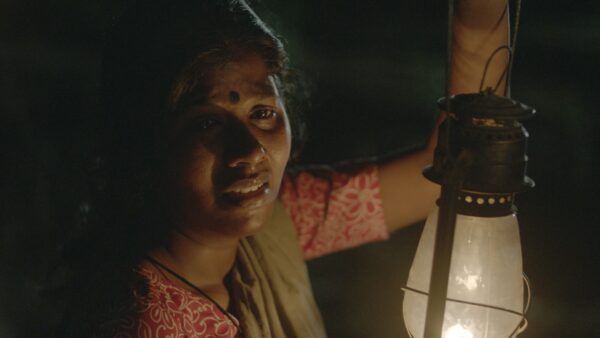
Maadathy 2
“I am a political being,” and that’s where her art comes from too. “However much I try, I cannot keep myself out of rage. I have to keep burning. My boiling point is my creative burst. I am more of a ‘heart’ person and all I invest is in my emotional intelligence. I have done nothing impersonal so far, neither in writing nor in films. I will continue to do what affects me deeply and let it define my voice.”
Leena finds herself going back to the “masters and classics” to keep herself inspired. “Kurosowa and Abbas Kairastomi continue to guide me in spirit. I can’t wait to watch the new works of Ceylan, Hanake, Cuaron, Gaspar Noe. The finest cinema has the power to transform you just like the finest of literature. I walk into Pedro Almodovar, Ken Loach, Kusturica and come out an altered person. What makes me sad these days is more and more pulp content is clouding the avantgarde. I always want to give my hands to a filmmaker who will take me to philosophical heights I haven’t experienced. I adore filmmakers who make me know myself more. Believe me there are few shamans in cinema who still do that,” she says.
Recommended
Maadathy is Leena’s first pure fiction and it is a mystery drama. “My next is a road film and next to next is erotica and I see myself doing a musical too. I am creative producing and ‘episode’ directing a political thriller webseries too. But for me always content is key. I don’t see myself as a genre filmmaker.”
Leena is also a prolific writer with five collections of poems in Tamil out already: Ottrailaiyena (As a Lone Leaf), Ulagin Azhagiya Mudhal Penn (The First Beautiful Women in the World), Parathaiyurul Raani (Queen of Sluts), Antharakanni and Chichili. Will we see another collection of poetry soon? “My sixth collection is in the making. I am interested in a universe now devoid of humans. Nature is the hero of my next collection of poems. Suddenly my language also has become minimal and giving. I am so wanting to flow in it.”
